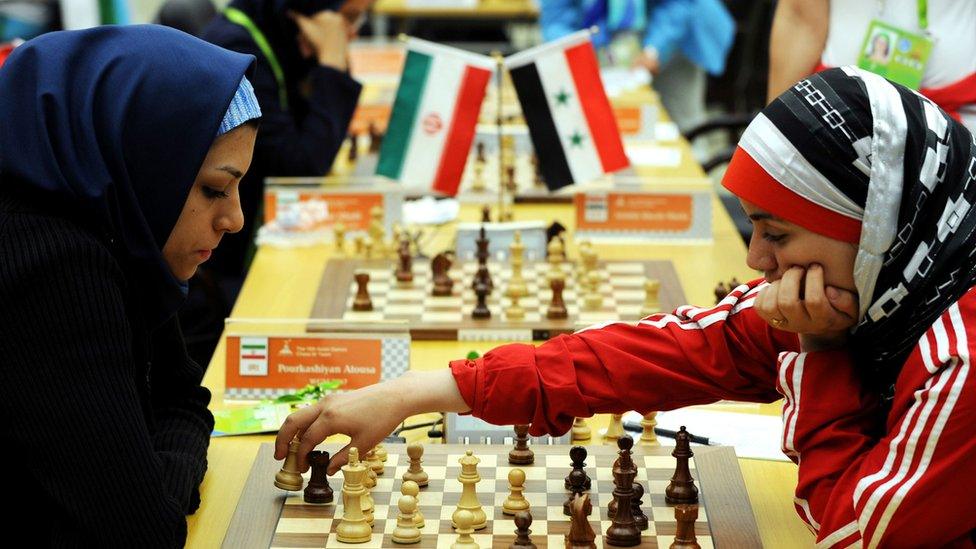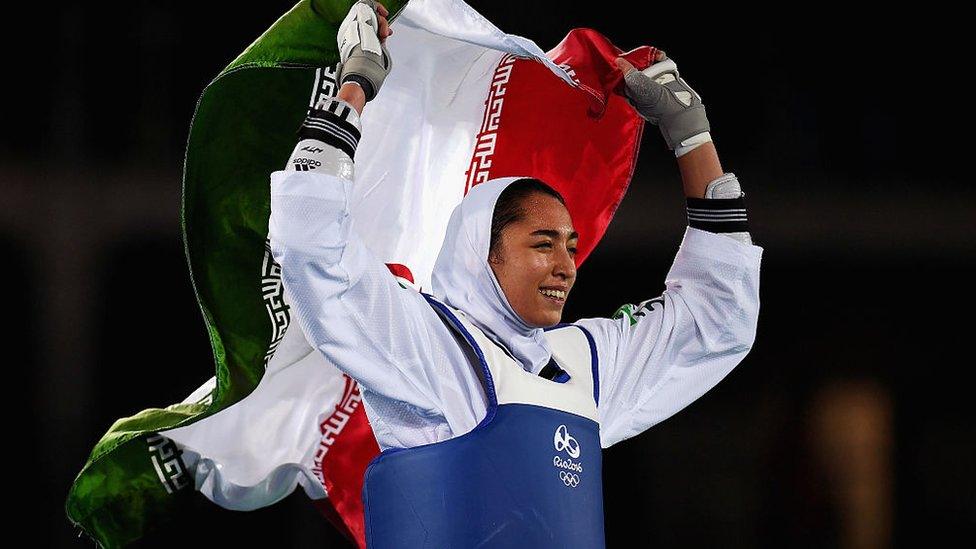Calls for chess boycott over Iran's hijab laws
- Published

Chess was banned in Iran for much of the decade that followed the 1979 Islamic Revolution
Calls for a boycott of next year's Women's World Chess Championship in Tehran, in protest at Iran's strict hijab laws, have prompted a big debate inside Iran in both the official and social media.
At stake are two of the most current and contentious issues in Iran - equal participation for women in sport and increasing resistance among growing numbers of Iranian women to their country's compulsory Islamic dress code.
BBC Persian has been listening to the arguments on both sides.
The controversy started after Iran was named as host country at the end of September, in the absence of any other volunteers, prompting dismay from some international players, including the current US champion, Nazi Paikidze.
Georgian-born Paikidze said she was taking a stand over the requirement for all women living in Iran or visiting the country to wear a headscarf.

Nazi Paikidze, current US champion, is boycotting next year's championship
"I think it's unacceptable to host a women's World Championship in a place where women do not have basic fundamental rights and are treated as second-class citizens," she said in widely publicized comments on her Instagram page, external.
Some Iranian women have welcomed Paikidze's support for an issue they have long campaigned on.
"I have never experienced the freedom of not wearing a veil without the fear of the morality police," wrote artist and activist Atena Daemi in an emotional Facebook post.
Currently on home leave from a seven-year prison sentence, Daemi wrote that she was paying the price for challenging the law in Iran and posting a photo of herself without her headscarf.
"The judge told me that by opposing the headscarf I am opposing the Koran, that I have committed blasphemy and that I should be executed."
Mina Alizadeh, a former member of Iran's national rowing team, told BBC Persian that hijabs were a cause of constant friction when she was competing internationally.
"The authorities were always putting pressure on us to be modest and observe full Islamic veiling or they would fire us from the national team," she said. "Several athletes were banned from international matches because they hadn't covered themselves properly. There was so much mental pressure on us."
Chess master Sabrina Chevannes on whether she would wear a hijab at next year's chess championship in Iran
To the increasing numbers of young Iranian women who are now pushing back against the hijab rules, the controversy around the chess championship is a chance to get wider support for their cause.
"The boycott campaign is just a start," says Maria from Tehran, "But it's a good start because it's created a big and much-needed discussion."
"The chess players should come to Iran and then refuse to play wearing their headscarves," says Susan from Tehran. "This would get much bigger media coverage."
And some think this should be the start of a wider protest movement.
"I think international male athletes should boycott events as well," says Mohammad, from the town of Langaroud in northern Iran. "If the men stop coming to Iran, the Iranian government will be forced to allow non-Iranian women to enter Iran without headscarves."
But others disagree, saying that a boycott will risk further polarising opinions inside the country.
"Our government will say, see, the world and the West is hostile to us," says Janet, from Ahwaz, who is was happy to wear the headscarf. "This will only boost the position of the conservative hardliners."

Iran's Kimia Alizadeh Zenoorim won a Taekwondo bronze medal at the Olympics
But whatever they feel about the hijab rules, many Iranians are also wary of anything that would reverse the modest gains made by Iranian sportswomen in recent years.
Iranian sportswomen did not make their post-revolution debut on the international sports stage until the 1990 Asian Games in Beijing.
Despite restrictions on dress, a relative lack of investment compared to men's sports, and a ban on women spectators at men's sports events, Iranian female athletes now compete abroad in a limited range of sports from football and volleyball to archery.
This summer there were huge celebrations in Iran when Taekwondo star Kimia Alizadeh Zenoorim won bronze at the Rio Olympics, becoming the first Iranian women to win an Olympic medal.
"If female chess players don't come to Iran, Iranian women will lose an opportunity to increase their experience," says Janet from the southern city of Ahwaz.
As many people are pointing out, chess was banned in Iran for much of the decade that followed the 1979 revolution, largely because of its pre-revolutionary association with gambling, so hosting a women's chess championship is already a significant step forward.
"There's no need for boycotting campaigns and making headlines," says Marzieh Azarafza, an activist from Tehran. "Our society is gradually solving conflicts between religious fundamentalism and modernity. Iranian women will gradually change the situation from within, so why should we stop that from happening?"